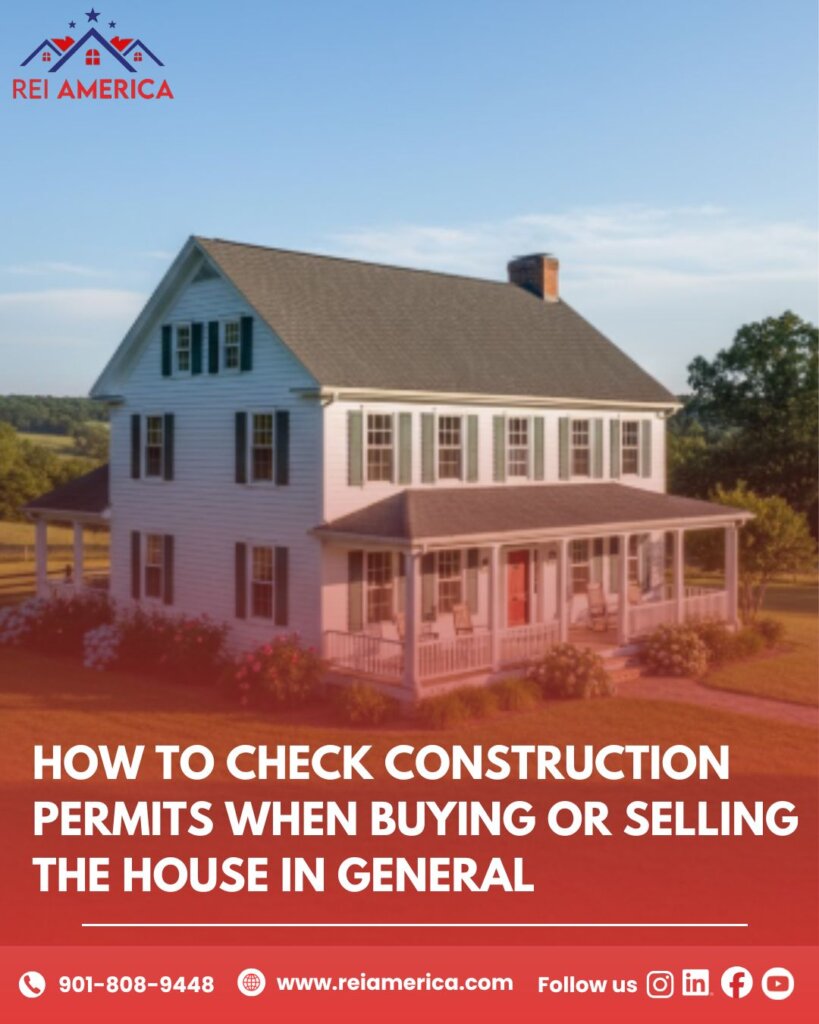When buying or selling a home, one detail that often gets overlooked—but can make or break a deal—is the construction permit history. Whether it’s a newly remodeled property or an older home with additions, checking construction permits helps you confirm that all improvements were done legally, safely, and up to code.
If you’re investing in real estate or preparing to sell, understanding how to verify construction permits can save you from future headaches, unexpected costs, and potential legal issues.
In this blog, we’ll walk you through how to check construction permits, why they matter, and how this process protects both buyers and sellers.

🔍 What Are Construction Permits?
A construction permit (or building permit) is official approval issued by a local government agency that authorizes a contractor or homeowner to construct, renovate, or alter a property.
Permits ensure that the work meets local building codes, zoning regulations, and safety standards. Examples include:
- New home construction
- Electrical or plumbing upgrades
- Roof replacements
- Room additions or garage conversions
- Foundation or structural repairs
🧾 Why Checking Construction Permits Is Important
Whether you’re buying, selling, or investing, checking construction permits provides peace of mind and financial protection.
✅ For Buyers:
- Ensures all renovations were legally approved.
- Helps identify unpermitted work that could affect insurance coverage or resale value.
- Confirms that property improvements meet safety and quality standards.
✅ For Sellers:
- Shows transparency and builds buyer confidence.
- Prevents last-minute deal cancellations during inspections.
- Adds credibility and can increase the property’s resale value.
✅ For Investors:
- Protects you from purchasing properties with potential code violations.
- Helps you assess renovation quality before investing.
- Reduces legal risks related to non-compliant construction.
🧠 How to Check Construction Permits Step-by-Step
Step 1: Visit Your Local Building Department Website
Most cities and counties have online databases where you can search by property address or parcel number. This allows you to view all approved permits, their status (open or closed), and inspection results.
Step 2: Request Records in Person or by Email
If online data isn’t available, contact your city’s building and safety department directly. They can provide copies of the permit history or details about specific construction work.
Step 3: Review the Scope of Work
Each permit includes a description of the project. Make sure the permits cover all visible improvements—such as remodeled kitchens, added rooms, or new roofs.
Step 4: Check for Final Inspections
A permit must be “finaled” or closed after inspection. Open permits can delay closings or cause issues with lenders and insurance companies.
Step 5: Verify Contractor Licensing
Confirm that all work was done by licensed professionals. Many states allow you to verify a contractor’s license online to ensure compliance and accountability.
🚧 Risks of Unpermitted Work
Unpermitted renovations can look appealing—but they come with hidden dangers:
- ❌ Fines or penalties for non-compliance
- ❌ Insurance denial in case of damage or injury
- ❌ Appraisal issues that lower property value
- ❌ Legal disputes during future sales
- ❌ Unsafe structures that require costly repairs
That’s why real estate professionals and investors always recommend checking permit history before closing a deal.
🏡 What to Do If You Find Unpermitted Work
Don’t panic—unpermitted work doesn’t always mean a dead deal. Here’s what you can do:
- Negotiate with the Seller: Request that they obtain retroactive permits or lower the price.
- Consult a Contractor: Have an expert assess whether the work meets safety standards.
- Apply for Retroactive Permits: Some cities allow you to legalize work by applying for “as-built” permits and scheduling inspections.
- Seek Professional Guidance: Partner with a trusted real estate agent or investment expert to navigate local building laws.
💡 Pro Tip for Real Estate Investors
If you’re investing in Memphis real estate or other fast-growing markets, due diligence is key. Always include permit verification in your property analysis checklist. This ensures your investment is profitable, compliant, and secure.
At REI America, we specialize in helping investors find fully compliant, high-ROI properties—so you can focus on growth without risk.
📞 Ready to Invest with Confidence?
Our team at REI America provides end-to-end support for real estate investors—from property sourcing to due diligence and marketing-ready renovations.
📧 Email: info@reiamerica.com
📞 Call: +1 (901) 808-9448
🌐 Visit: www.reiamerica.com
Let’s make your next property investment safe, smart, and successful.
